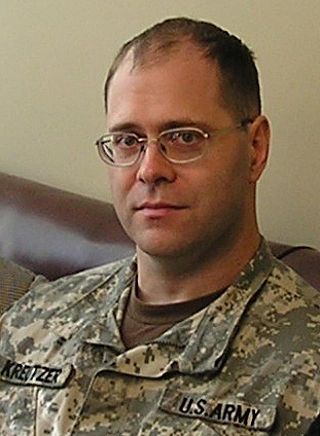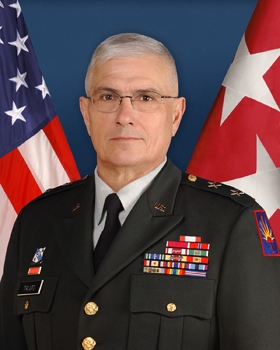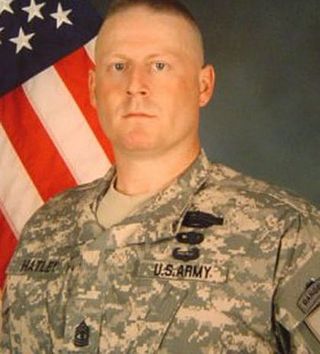
Fragging is the deliberate or attempted killing of a soldier, usually a superior, by a fellow soldier. U.S. military personnel coined the word during the Vietnam War, when such killings were most often committed or attempted with a fragmentation grenade, to make it appear that the killing was accidental or during combat with the enemy. The term fragging now encompasses any deliberate killing of military colleagues.

The United States Disciplinary Barracks (USDB), colloquially known as Leavenworth, is a military correctional facility located on Fort Leavenworth, a United States Army post in Kansas. It is one of two major prisons built on Fort Leavenworth property, the other is the military Midwest Joint Regional Correctional Facility, which opened on 5 October 2010. It reports to the United States Army Corrections Command and its commandant usually holds the rank of colonel.

Charles A. Graner Jr. is an American former soldier who was court-martialed for prisoner abuse after the 2003–2004 Abu Ghraib prisoner abuse scandal. Along with other soldiers of his Army Reserve unit, the 372nd Military Police Company, Graner was accused of allowing and inflicting sexual, physical, and psychological abuse on Iraqi detainees in Abu Ghraib prison, a notorious prison in Baghdad during the United States' occupation of Iraq.
Megan Ambuhl, is a former United States Army Reserve soldier who was convicted of dereliction of duty for her role in the prisoner abuse that occurred at Abu Ghraib prison, a notorious prison in Baghdad during the United States' occupation of Iraq.

William J. Kreutzer Jr. is a former United States Army soldier who was convicted of killing one officer and wounding 18 other soldiers when he opened fire on a physical training formation on October 27, 1995, at Fort Bragg, North Carolina. Kreutzer was sentenced to death, but his sentence was later commuted to life in prison by the Army Court of Criminal Appeals in connection with concerns regarding mental illness.

Ehren Keoni Watada is a former first lieutenant of the United States Army, best known as the first commissioned officer in the US armed forces to refuse to deploy to Iraq. In June 2006, Watada refused to deploy for his unit's assigned rotation to Operation Iraqi Freedom, saying he believed the war to be illegal and that, under the doctrine of command responsibility, it would make him party to war crimes. At the time, he was assigned to duty with the 5th Battalion, 20th Infantry Regiment, part of the 3rd Brigade, 2nd Infantry Division, as a fire support officer. He was brought before a court-martial in 2007 which ended in a mistrial; the Army subsequently discharged him under "Other-Than-Honorable-Conditions" (OTH) in 2009. An OTH discharge is the least favorable type of administrative discharge from the Army, and is reserved for a "pattern of behavior that constitutes a significant departure from the conduct expected of Soldiers of the Army."

Michael (Stewart) Waddington is an American criminal defense lawyer specializing in court-martial cases, war crimes, and other serious felonies. He defended Sgt. Alan Driver, accused of abusing detainees, and Specialist Hunsaker in the Operation Iron Triangle Case.
Operation Iron Triangle was a military operation in the Iraq War. The operation was led by Michael D. Steele in 2006. The operation targeted a suspected al-Qaeda in Iraq training facility southwest of the city of Samarra near the Muthana Chemical Complex south of Lake Tharthar.
Dustin Berg is a former member of the Indiana National Guard. In July 2005, he pleaded guilty to fatally shooting Hussein Kamel Hadi Dawood al-Zubeidi, who had been his partner during the U.S. occupation of Iraq. He was sentenced to serve 18 months.

Joseph J. Taluto is a retired United States Army officer who served as the Adjutant General of New York. As adjutant general, he was the director of the New York State Division of Military & Naval Affairs, and served as overall commander of the New York Army National Guard, New York Air National Guard, New York Guard and New York Naval Militia. Taluto commanded the 42nd Infantry Division in Iraq during Operation Iraqi Freedom from 2004 to 2006. He attained the rank of major general, and was a recipient of the Army Distinguished Service Medal, Legion of Merit, and Bronze Star Medal.

Forward Operating Base Danger was a forward operating base operated by the United States Army in Tikrit, Iraq from the time of the occupation of Iraq in 2003 until November 2005 when it was handed over to the government of Iraq.

John E. Hatley is a former first sergeant who was prosecuted by the United States Army in 2008 for murdering four Iraqi detainees near Baghdad, Iraq in 2006. He was convicted in 2009 and sentenced to life in prison at the Fort Leavenworth Disciplinary Barracks. He was released on parole in October 2020. Hatley is colloquially associated with a group of US military personnel convicted of war crimes known as the Leavenworth 10.
On May 11, 2009, five United States military personnel were fatally shot at a military counseling clinic at Camp Liberty, Iraq by Army Sergeant John M. Russell. In the days before the killings, witnesses stated Russell had become distant and was having suicidal thoughts.

Nidal Malik Hasan is a Palestinian-American former United States Army major, physician and mass murderer convicted of killing thirteen people and injuring more than 30 others in the Fort Hood mass shooting on November 5, 2009. Hasan, an Army Medical Corps psychiatrist, admitted to the shootings at his court-martial in August 2013.

Michael Chase Behenna is a former United States Army First Lieutenant who was convicted of the 2008 murder of Ali Mansur Mohamed during the occupation of Iraq. Behenna is colloquially associated with a group of U.S. military personnel convicted of war crimes known as the Leavenworth 10. He was sentenced to 25 years imprisonment, which was later reduced to 15 years, and served his sentence in the United States Disciplinary Barracks on Fort Leavenworth, a United States Army post in Kansas. He was granted parole on March 14, 2014, after serving less than five years of his sentence. Since his release from prison he has worked as a farmhand. On May 6, 2019, Behenna received a pardon from President Donald Trump.

The Maywand District murders were the thrill killings of at least three Afghan civilians perpetrated by a group of U.S. Army soldiers from January to May 2010, during the War in Afghanistan. The soldiers, who referred to themselves as the "Kill Team", were members of the 3rd Platoon, Bravo Company, 2nd Battalion, 1st Infantry Regiment, and 5th Brigade, 2nd Infantry Division. They were based at FOB Ramrod in Maiwand, in Kandahar Province of Afghanistan.
United States v. Hasan K. Akbar was the court-martial of a United States Army soldier for a premeditated attack in the early morning hours of March 23, 2003, at Camp Pennsylvania, Kuwait, during the start of the United States invasion of Iraq.
Derrick Miller is a former US Army National Guardsman sergeant who was sentenced in 2011 to life in prison with the chance of parole for the murder of an Afghan civilian during a battlefield interrogation. Miller is colloquially associated with a group of U.S. military personnel convicted of war crimes known as the Leavenworth 10. After being incarcerated for eight years, Miller was granted parole and released in 2019. He currently serves as the Executive Director of the Justice for Warriors Caucus and Military Adviser to Texas Republican U.S. Representative Louie Gohmert.
The Eastburn family murders were the murders of Kathryn "Katie" Eastburn and her daughters, Kara and Erin, which occurred in Fayetteville, North Carolina, in May 1985. In 1986, United States Army Sergeant Timothy Hennis was tried and convicted for the three murders. In 1988, Hennis's conviction was overturned on appeal, and he was acquitted the following year. In 2006, the Cumberland County Sherriff's Office obtained DNA evidence linking Hennis to the crime. Despite the Fifth Amendment's Double Jeopardy Clause prohibiting retrials after acquittals, the United States Army was able to initiate prosecution and trial proceedings against Hennis under the dual sovereignty doctrine. In 2010, Hennis was tried and convicted by an Army court-martial for the triple murders and sentenced to death.
Federico Daniel Merida is a former U.S. Army National Guardsman Specialist who pleaded guilty to murdering an Iraqi teenager. On May 11, 2004, after a sexual encounter, Merida shot 17-year-old Falah Zaggam, an Iraqi National Guard Private, 11 times in a guard tower, then threw his body off the building.













